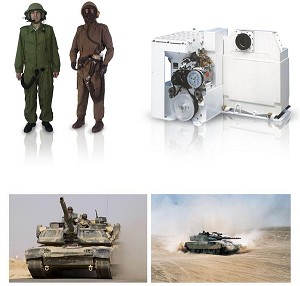The use of Life Support System (LSS) Within Modern Armoured Vehicle

Keywords: Life Support System (LSS), Armoured Fighting Vehicle (AFV), Microclimate cooling, Individual Crew Cooling System (ICCS), NBC Protection, Auxiliary Power Unit (APU)
1. Introduction
Armoured Vehicles personnel are being exposed to high ambient temperatures and humidity with dry bulb temperatures inside the cabin exceed 60C. Since dry bulb temperatures exceed skin temperatures, avenues for convective heat loss are not possible, and actually the radiation and convective heat transfer would be directed towards the body and would represent a source of heat gain. As a result, the only avenue for heat dissipation in these environments is through the evaporation of sweat at the skin surface and through respiration. Depending on the clothing that is worn and the rate of internal body heat production, which is function of the activity level, it is possible that the maximum evaporative heat rejection that can be achieved is insufficient to maintain body thermal steady-state. In these non-compensable heat stress situations, the body accumulates heat, body core temperature continuously increases and eventually exhaustion and collapse occurs.
For more than 25 years Kinetics Ltd. has been developing and producing complex Life Support Systems (LSS) for Armoured Fighting Vehicles (AFV). Typically LSS are integrated Environmental Control Systems (ECS), Nuclear Biological Chemical (NBC) Protection Systems and sometimes also Auxiliary Power Units (APU). In 1995 Kinetics has completed its development of Individual Crew Cooling System (ICCS) for Main Battle Tanks (MBT) and AFVs. During this development unique knowledge has been gained by the company regarding the physiological and human engineering aspects of body cooling, and extensive experience was accumulated regarding the application of this technology on MBTs and AFVs.
2. Purpose
The purpose of this paper is to explain the concept of Kinetics' LSS and ICCS and describe their importance in maintaining the performance and reducing fatigue of AFV crews, while operating in extremely high heat-loads and in NBC environment.
3. Kinetics' Life Support Systems (LSS):
Kinetics' Life Support System (LSS) is an integrated comprehensive solution providing some or all of the following functions:
- Cabin Heating, Ventilation & Air-Conditioning (HVAC)
- Individual Crew Cooling (ICCS)
- NBC /CBRN Protection
- NBC /CBRN Detection
- Auxiliary Power
- Fire Suppression
3.1 HVAC - Heating Ventilation & Air-Conditioning:
- Cabin HVAC is effective in small and medium size vehicles that are operated with close doors and hatches. The HVAC provides:
- Powerful cooling, heating & dehumidification of the crew cabin
- Dust free and conditioned fresh-air delivery to the crew cabin in ventilation mode
3.2 Individual Crew Cooling System (ICCS)
ICCS was developed by Kinetics to provide crew and equipment cooling for special applications, and it is fielded since 1997 on the entire fleet of Israeli Merkava 3 & 4 MBTs.
The ICCS concept of operation is based on cooled and dried airflow that is provided from a special air-conditioner to air-cooled overalls or vests. The uniform airflow around the torso allows effective sweat evaporation and excellent natural cooling of the entire body. There is no need in head, face or legs cooling.
Physiological tests that were conducted with the participation of Main Battle Tank (MBT) crews, in Israel in 1994 and in Australia in 2001 shows the excellent effect of ICCS on the Heart Rate and Core Temperature. These two parameters were kept at normal levels in soldiers that were using ICCS while being exposed to extremely high heat loads on the MBT. The same soldiers under the same environment, developed non-compensable Heart Rate and Core Temperature increase while operating the MBT without ICCS or with alternative cooling methods.
ICCS is an effective solution in special applications such as:
- Main Battle Tanks (MBT), Self Propelled Howitzers (SPH), Helicopters and other platforms where there are just a few crewmen onboard and platform constrains (power, open hatches, etc.) wouldn't allow cabin cooling.
- Special Application Vehicles (e.g. Command Post, Reconnaissance, Electronic Warfare, Police Mission, etc.) where crew and equipment must be optimally cooled also while operating the vehicle with open doors or hatches.
- NBC Reconnaissance Vehicle - where crew can be optimally cooled and protected with the unique NBC Air-Cooled Overalls.
There are three types of Air-Cooled Overalls or Vests (ACO/V):
- Regular / Fire Resistant Air-Cooled Overall
- NBC Protected Air-Cooled Overall
- Air-Cooled Compact Vest (to be worn under regular shirt or overall).
For more information, please feel free to contact us or visit our website at: www.kinetics.co.il
Company Center: Elbit Systems - Kinetics
